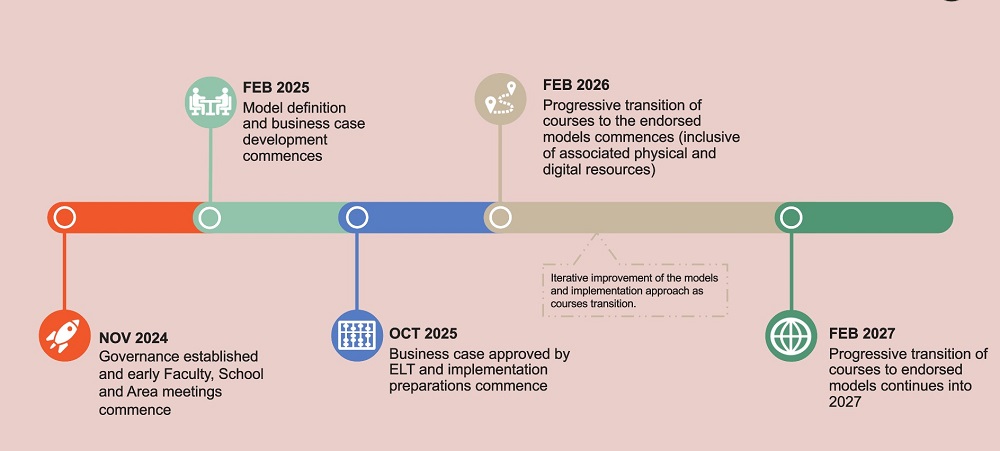Aligned with the Education Strategy Vision 2030 (ESV) we are planning for the progressive transition of our award courses to align with three Models of Engagement: Fully online, in-person immersive, and hybrid. Each Model of Engagement will have commonly defined characteristics of teaching, assessment and the student experience.
Each course will have clearly articulated pedagogies, aligned with the models, enabling staff to focus on impactful teaching that considers how, when, and where students learn, in regional Australia, nationally, and internationally. Students will be at the heart of this initiative, with opportunities to contribute to its development. We will ensure students can make informed study choices, engage meaningfully with their learning, and prepare effectively for contemporary professional life after graduation.
As we implement this initiative over time, it will also improve strategic use of campus locations, infrastructure, and software, improving the vibrancy and purpose of our physical campuses and online environments.
✔ New models of engagement standards and requirements defined for our coursework award courses across the following :
✔ Progressive transition of each of our coursework award courses, including Bachelor and Master level courses, to the defined models of engagement.
✔ Co-design of the models with faculty, schools, courses, students and broader university stakeholders, sharing skills and understandings.
✔ Consistent course-level information for students on how they will engage with and experience learning at Charles Sturt.
✔ New principles and guidelines for course-level programmatic assessment and feedback, including new staged assessments, acknowledging the impact of artificial intelligence in learning and teaching.
✔ Iterative improvement of the models as courses transition.
✔ Infrastructure and support changes linked to the models.
The Models of Engagement and Assessment will be scalable, sustainable learning and teaching models that define how our students engage with and experience their learning.
|
The MEA initiative is led by the Division of Learning and Teaching (DLT), bringing together academic and business staff with expertise in curriculum design, pedagogy, student experience, project and change management.
MEA governance is supported by a steering committee and a range of decision-making and consultative groups. These groups include representative staff from across the University, ensuring a collaborative and informed approach to shaping and implementing the models.
A series of interactive workshops are being held to define, validate and refine the requirements for each Model of Engagement. These sessions bring together academic leaders and other key stakeholders to explore best practices, identify challenges and develop solutions that align with student needs and institutional priorities.
Additional workshops are also focused on building and refining the business case, ensuring that the transition to the new models is strategically sound, financially sustainable and well-supported across the University.

Please get in touch if you have any additional questions or feedback about the initiative.